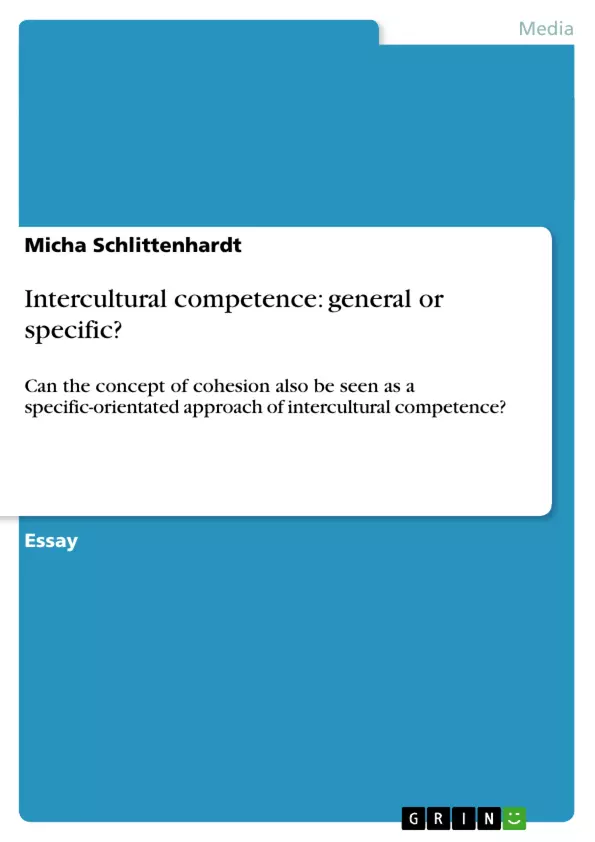The debate on the concept of Intercultural Competence became a wide field of interest in recent years which could be especially seen on the discourse in the German-speaking world (Cf. Bolton, 2006; Rathje 2007). Furthermore, it gained importance in society due to the development towards an intercultural society in Germany and the question for integration (Cf. Seifert 2012). Business sector and governments are therefore in search for Intercultural Competence in order to counter these issues (ibid.).
Inhaltsverzeichnis (Table of Contents)
- The Development of an Intercultural Competence Construct
- 1A Counter Approach and the Definition of Culture
- The Classical Approach as Specific Scope
- 2The Cohesion-Based Approach as Answer
- The Right Balance
Zielsetzung und Themenschwerpunkte (Objectives and Key Themes)
This essay explores the multifaceted concept of Intercultural Competence, specifically examining the debate surrounding whether this competence should be viewed as a general or specific phenomenon. The essay delves into the historical development of models for intercultural competence and examines the influence of different cultural definitions, particularly the coherence-based and cohesion-based approaches.
- The evolution of models for intercultural competence
- The role of cultural definitions in understanding intercultural competence
- The coherence-based vs. cohesion-based approaches to culture
- The implications of these approaches for intercultural competence training
- The search for a balanced perspective on general and specific aspects of intercultural competence
Zusammenfassung der Kapitel (Chapter Summaries)
The essay begins by outlining the historical development of the intercultural competence construct, exploring different models that have emerged over time. These models are based on various dimensions, including affective, conative, and cognitive components. The author then introduces the coherence-based definition of culture, which emphasizes differences between cultures as the basis for understanding intercultural encounters. This approach leads to a focus on specific cultural frameworks and rules for interaction.
The essay then presents a counter approach – the cohesion-based model – which emphasizes the shared experiences and similarities between individuals who belong to multiple cultural groups. This approach suggests that intercultural competence arises from the individual's ability to connect with others through shared values and behaviors. This perspective shifts the focus to a more general understanding of intercultural competence, emphasizing the shared humanity of individuals regardless of their cultural background.
The author explores the potential limitations of both approaches, acknowledging that a balanced perspective that considers both general and specific aspects of intercultural competence is necessary for effective intercultural communication and training.
Schlüsselwörter (Keywords)
The primary focus of the essay is on the concept of Intercultural Competence and its relationship to different definitions of culture. Key terms include: intercultural competence, coherence-based approach, cohesion-based approach, general scope, specific scope, cultural intelligence, multi-collectivism, intercommunity, intercultural communication, and intercultural training.
Frequently Asked Questions
Is intercultural competence a general or specific skill?
The essay explores both views: the specific approach focuses on knowledge of a particular culture, while the general approach emphasizes universal communication skills.
What is the coherence-based approach to culture?
This classical approach views culture as a closed system with distinct differences, leading to a focus on culture-specific interaction rules.
What is the cohesion-based model?
This model emphasizes similarities and shared values across cultural boundaries, focusing on the individual's ability to connect regardless of background.
Why is intercultural competence gaining importance in Germany?
Due to the development towards an intercultural society and the resulting questions regarding integration and global business success.
What are the components of intercultural competence models?
Most models include affective (emotions), conative (behavior), and cognitive (knowledge) dimensions.
- Arbeit zitieren
- Micha Schlittenhardt (Autor:in), 2012, Intercultural competence: general or specific?, München, GRIN Verlag, https://www.hausarbeiten.de/document/268140


